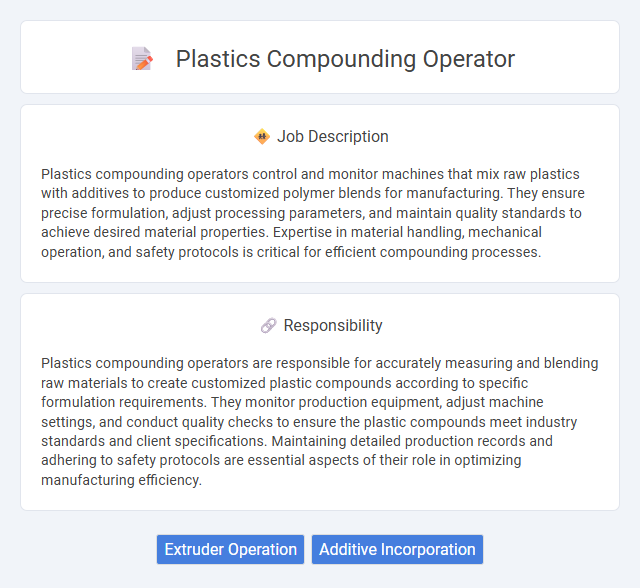
Plastics compounding operators control and monitor machines that mix raw plastics with additives to produce customized polymer blends for manufacturing. They ensure precise formulation, adjust processing parameters, and maintain quality standards to achieve desired material properties. Expertise in material handling, mechanical operation, and safety protocols is critical for efficient compounding processes.
Individuals with good physical stamina and attention to detail are likely suitable for a plastics compounding operator role, as the job often involves standing for long periods and monitoring machinery. Those who thrive in repetitive, structured environments and can maintain focus under moderate pressure may find this position aligns well with their skills. It is probable that people with strong safety awareness and basic technical aptitude will adapt more easily to the responsibilities involved in plastics compounding operations.
Qualification
A plastics compounding operator must possess a high school diploma or equivalent, with specialized training or certification in polymer science or plastics technology preferred. Proficiency in operating and maintaining extrusion and mixing equipment, along with knowledge of safety protocols and quality standards, is essential. Strong analytical skills and experience in monitoring material formulations ensure consistent production of high-quality compounded plastics.
Responsibility
Plastics compounding operators are responsible for accurately measuring and blending raw materials to create customized plastic compounds according to specific formulation requirements. They monitor production equipment, adjust machine settings, and conduct quality checks to ensure the plastic compounds meet industry standards and client specifications. Maintaining detailed production records and adhering to safety protocols are essential aspects of their role in optimizing manufacturing efficiency.
Benefit
Plastics compounding operator jobs likely offer competitive wages due to the technical skills required for managing and mixing raw materials to create specific plastic formulations. Employees may benefit from on-the-job training and opportunities for advancement within manufacturing plants focused on plastics production. Job stability is probable in industries that consistently demand customized plastic products for automotive, packaging, and consumer goods sectors.
Challenge
The role of a plastics compounding operator likely demands a keen attention to detail due to the precise mixing of raw materials required for consistent product quality. There is a probability that operators face technical challenges when adjusting machine settings to accommodate varying batch specifications and material properties. Meeting production targets while maintaining safety standards adds another layer of complexity to this position.
Career Advancement
Plastics compounding operators manage the precise blending of raw materials to create specific plastic formulations, a role that demands technical skill and attention to detail. Career advancement often leads to positions such as lead operator, process supervisor, or quality control specialist, where expertise in polymer science and production efficiency is essential. Gaining certifications in plastics technology and mastering advanced machinery operation can significantly enhance promotion prospects and salary potential in this field.
Key Terms
Extruder Operation
Plastics compounding operators specialize in managing extruder machines to blend raw polymer materials with additives, ensuring precise melt temperature and pressure for consistent pellet quality. They monitor extrusion parameters such as screw speed, barrel temperature, and feed rate to optimize throughput and maintain product specifications. Skilled in troubleshooting extrusion issues, operators adjust machine settings to prevent defects like surging, die lines, or contamination during high-volume plastic compounding processes.
Additive Incorporation
A Plastics Compounding Operator specializing in Additive Incorporation ensures precise blending of additives such as stabilizers, fillers, and colorants into polymer resins to enhance material properties. This role requires monitoring mixing equipment parameters to achieve uniform dispersion and maintain compound consistency. Expertise in handling different additive formulations optimizes product performance in diverse applications like automotive components and packaging materials.
 kuljobs.com
kuljobs.com